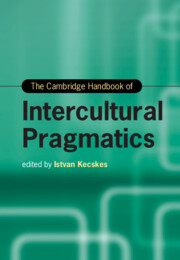Book contents
- The Cambridge Handbook of Intercultural Pragmatics
- Cambridge Handbooks in Language and Linguistics
- The Cambridge Handbook of Intercultural Pragmatics
- Copyright page
- Contents
- Figures
- Tables
- Acknowledgment
- Contributors
- Introduction The Rise of Intercultural Pragmatics
- Part I Theoretical Foundation
- 1 Post-Gricean Pragmatics for Intercultural Communication
- 2 Relevance Theory and Intercultural Communication
- 3 Cognitive Psychology in Pragmatics
- 4 The Theoretical Framework of Intercultural Pragmatics
- Part II Key Issues in Intercultural Pragmatics Research
- Part III Interface of Intercultural Pragmatics and Related Disciplines
- Part IV Intercultural Pragmatics in Different Types of Communication
- Part V Language Learning
- Index
- References
3 - Cognitive Psychology in Pragmatics
from Part I - Theoretical Foundation
Published online by Cambridge University Press: 29 September 2022
- The Cambridge Handbook of Intercultural Pragmatics
- Cambridge Handbooks in Language and Linguistics
- The Cambridge Handbook of Intercultural Pragmatics
- Copyright page
- Contents
- Figures
- Tables
- Acknowledgment
- Contributors
- Introduction The Rise of Intercultural Pragmatics
- Part I Theoretical Foundation
- 1 Post-Gricean Pragmatics for Intercultural Communication
- 2 Relevance Theory and Intercultural Communication
- 3 Cognitive Psychology in Pragmatics
- 4 The Theoretical Framework of Intercultural Pragmatics
- Part II Key Issues in Intercultural Pragmatics Research
- Part III Interface of Intercultural Pragmatics and Related Disciplines
- Part IV Intercultural Pragmatics in Different Types of Communication
- Part V Language Learning
- Index
- References
Summary
Default interpretation is crucial for the socio-cognitive approach (SCA) and intercultural pragmatics. Participants of intercultural interactions represent different speech communities and cultures, so defaultness can hardly work the way it does in L1. The cognitive mechanism is the same, but the result is different. As interlocutors in intercultural encounters belong to different speech communities, they share limited core common ground of the target language (English), which is the basis for relatively similar default interpretations in L1. Research in intercultural communication and L2 use (e.g. House 2002; Cieslicka 2007; Kecskes 2010) demonstrated the priority of literal meaning in both production and comprehension. Literal meanings of lexical units serve as core common ground for interlocutors with different L1 backgrounds when they communicate in English. In order for us to understand how default interpretation works in intercultural interactions, first we need to get to know how defaultness occurs in L1. Giora’s study will help us do that.
- Type
- Chapter
- Information
- The Cambridge Handbook of Intercultural Pragmatics , pp. 63 - 82Publisher: Cambridge University PressPrint publication year: 2022

